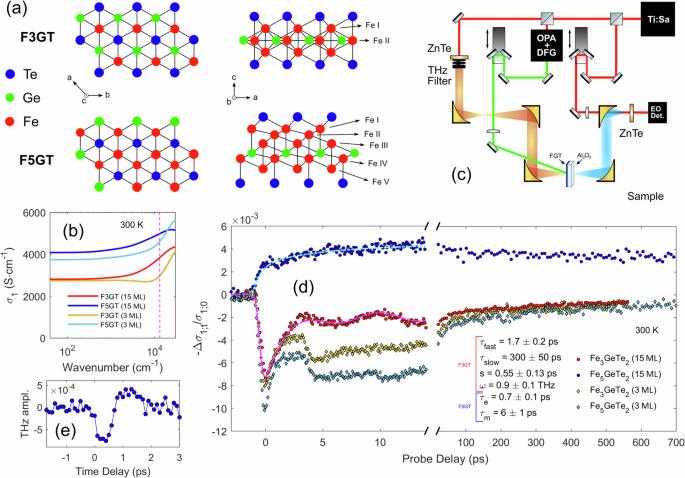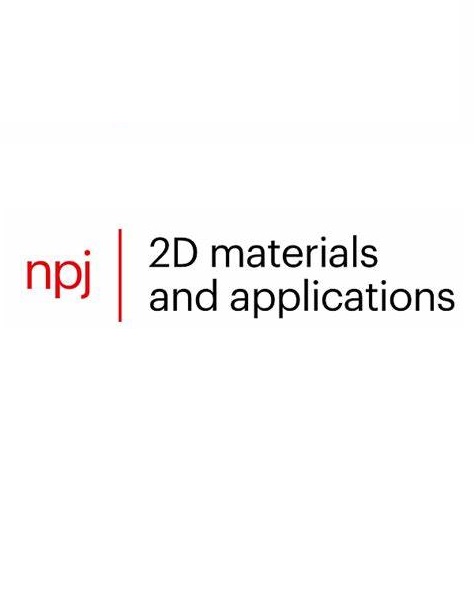Light-driven electrodynamics and demagnetization in FenGeTe2 (n = 3, 5) thin films
IF 8.8
2区 材料科学
Q1 MATERIALS SCIENCE, MULTIDISCIPLINARY
引用次数: 0
Abstract
Two-dimensional materials-based ultrafast spintronics are expected to surpass conventional data storage and manipulation technologies, that are now reaching their fundamental limits. The newly discovered van der Waals (VdW) magnets provide a new platform for ultrafast spintronics since their magnetic and electrical properties can be tuned by many external factors, such as strain, voltage, magnetic field, or light absorption for instance. Here, we report on the direct relationship between magnetic order and Terahertz (THz) electrodynamics in FenGeTe2 (n = 3, 5) (FGT) films after being illuminated by a femtosecond optical pulse, studying their ultrafast THz response as a function of the optical pump-THz probe temporal delay. In Fe5GeTe2, we find clear evidence that light-induced electronic excitations directly influence THz electrodynamics similarly to a demagnetization process, contrasting with the effects observed in Fe3GeTe2, which are characterized by a thermal energy transfer among electrons, magnons, and phonons. We address these effects as a function of the pump fluence and pump-probe delay, and by tuning the temperature across the magnetic ordering Curie temperature, highlighting the microscopic mechanisms describing the out-of-equilibrium evolution of the THz conductivity. Finally, we find evidence for the incoherent-coherent crossover predicted by the Kondo-Ising scenario in Fe3GeTe2 and successfully simulate its light-driven electrodynamics through a three-temperature model. As indicated by these results, FGT surpasses conventional metals in terms of modulating their properties using an optical lever.

FenGeTe2 (n = 3, 5) 薄膜中的光驱动电动力学和退磁现象
基于二维材料的超快自旋电子学有望超越传统的数据存储和操纵技术,而这些技术目前已达到其基本极限。新发现的范德华(VdW)磁体为超快自旋电子学提供了一个新平台,因为它们的磁性和电性可以通过应变、电压、磁场或光吸收等多种外部因素进行调整。在这里,我们报告了 FenGeTe2(n = 3,5)(FGT)薄膜在飞秒光脉冲照射下的磁序与太赫兹(THz)电动力学之间的直接关系,研究了它们的超快太赫兹响应与光泵-THz探针时间延迟的函数关系。在 Fe5GeTe2 中,我们发现了明确的证据,表明光诱导的电子激发直接影响了太赫兹电动力学,类似于去磁过程,这与在 Fe3GeTe2 中观察到的效应形成了鲜明对比,后者的特点是电子、磁子和声子之间的热能传递。我们将这些效应作为泵浦通量和泵浦-探针延迟的函数,并通过调整温度跨越磁有序居里温度来加以解决,从而突出了描述太赫兹电导率失衡演化的微观机制。最后,我们在 Fe3GeTe2 中找到了 Kondo-Ising 方案所预测的非相干-相干交叉的证据,并通过三温模型成功模拟了其光驱动电动力学。这些结果表明,FGT 在使用光学杠杆调节其性质方面超越了传统金属。
本文章由计算机程序翻译,如有差异,请以英文原文为准。
求助全文
约1分钟内获得全文
求助全文
来源期刊

npj 2D Materials and Applications
Engineering-Mechanics of Materials
CiteScore
14.50
自引率
2.10%
发文量
80
审稿时长
15 weeks
期刊介绍:
npj 2D Materials and Applications publishes papers on the fundamental behavior, synthesis, properties and applications of existing and emerging 2D materials. By selecting papers with the potential for impact, the journal aims to facilitate the transfer of the research of 2D materials into wide-ranging applications.
 求助内容:
求助内容: 应助结果提醒方式:
应助结果提醒方式:


